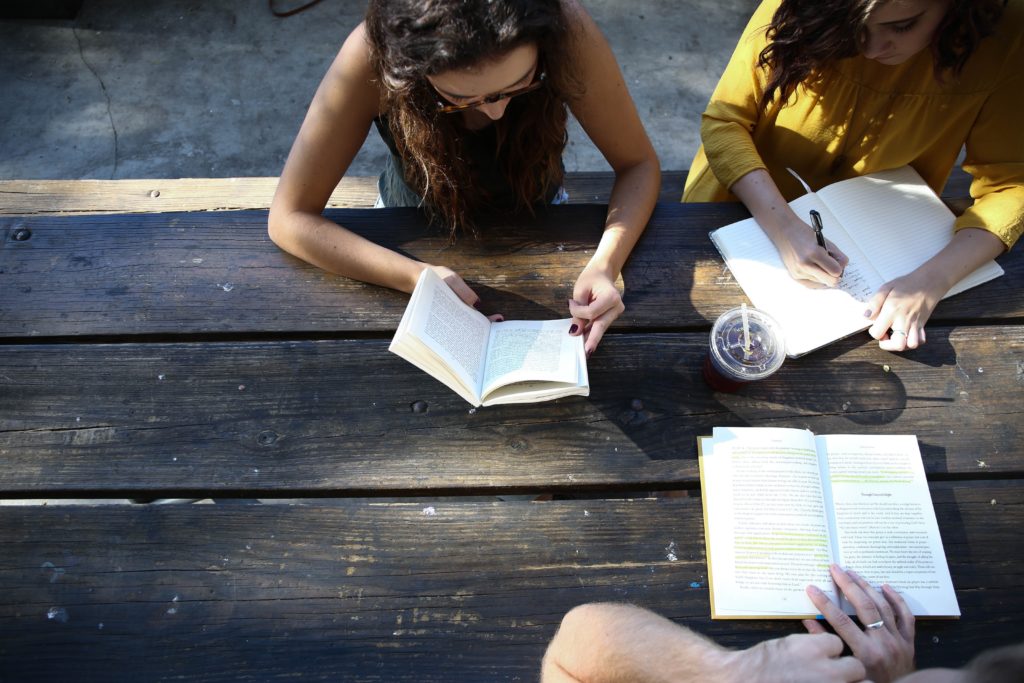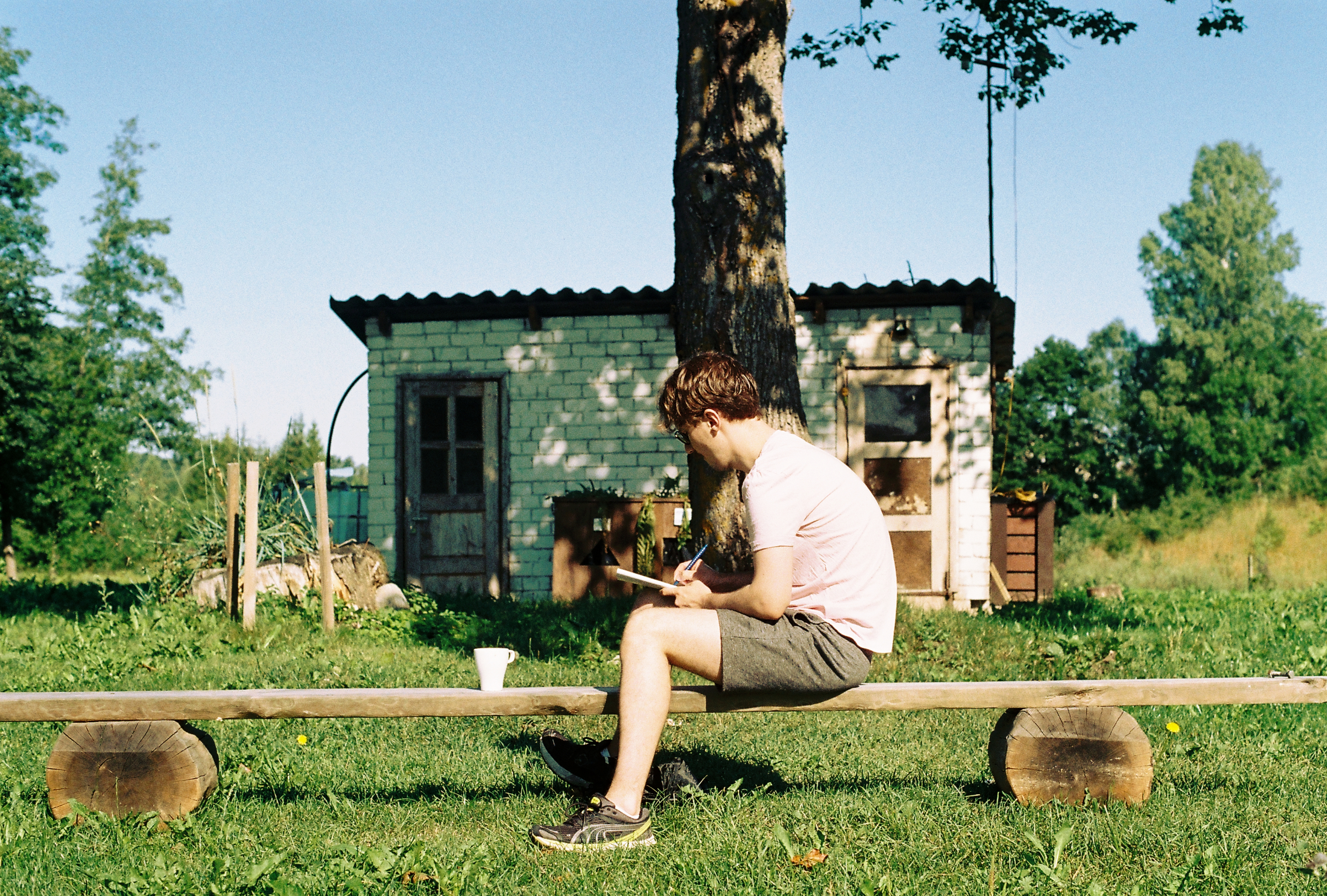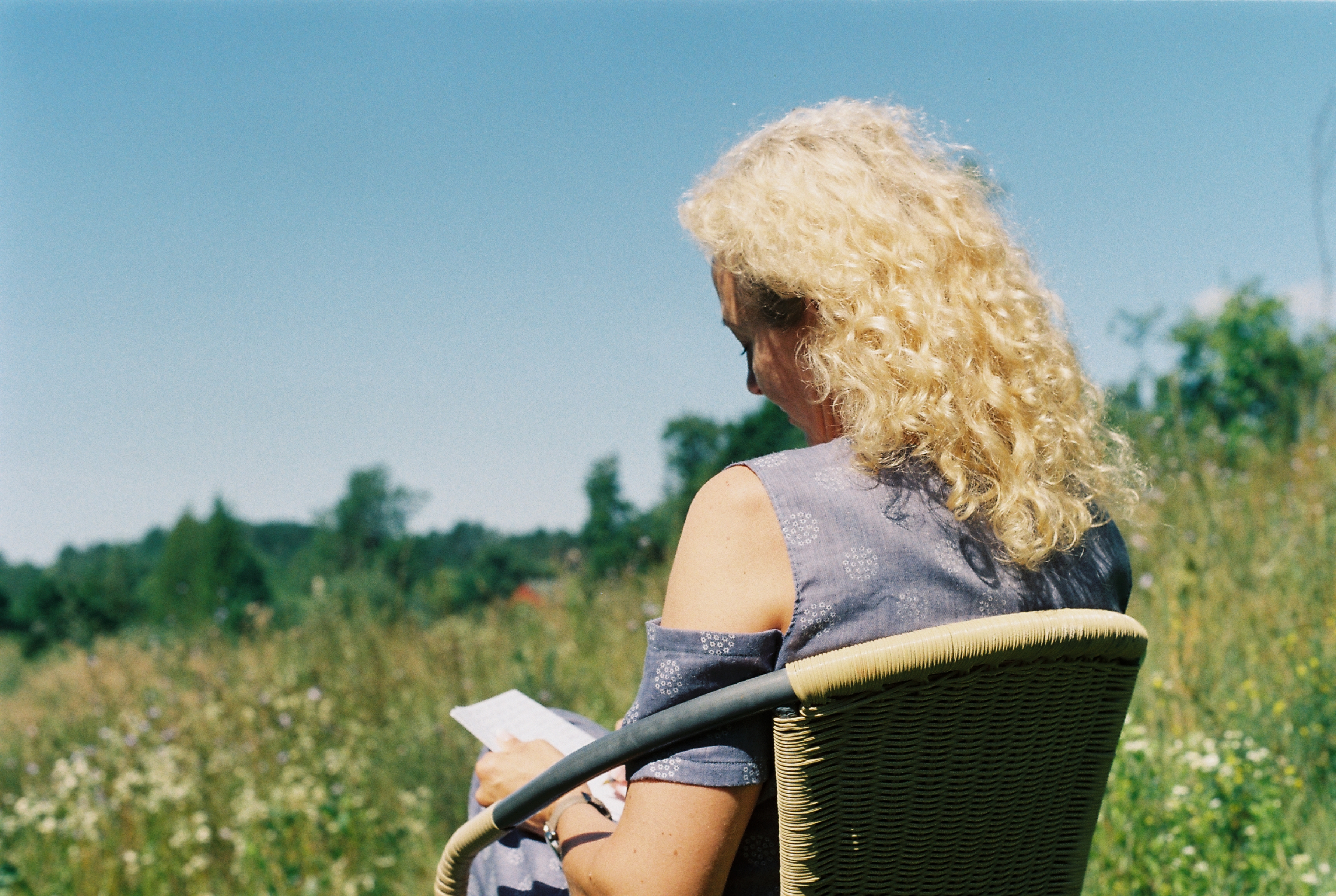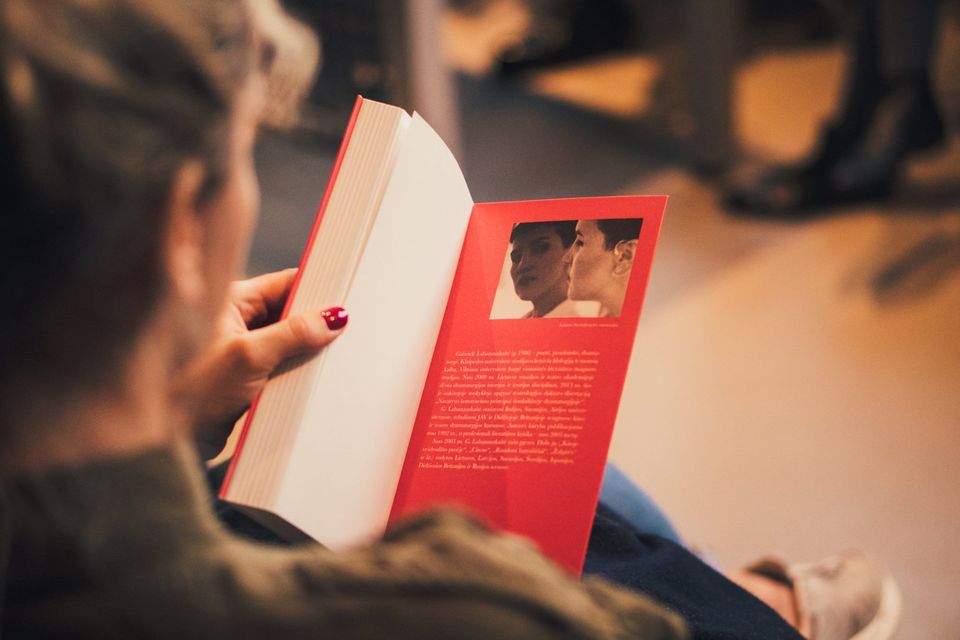BLOOD BROTHERS
Translated by Dovilė Lapinskaitė
CHARACTERS
JOHN
JOSEPH
MARIA
ADAS
NINA
KAJUS
JOURNALIST
CHOIR
PROLOGUE
I have lost my brother –
He slipped under the ice,
I have lost my brother –
He loved to swim so much!
I have lost my brother –
He did not know how to fish.
I have lost my brother –
I have tried
To turn him into fish.
TWO CHILDHOODS
JOSEPH. I wish I wasn’t here.
JOHN. Our parents doubted whether to get married. Lost, young, poor.
JOSEPH. Idiots.
JOHN. Mom was pregnant.
JOSEPH. And what to do? One more mistake.
JOHN. It was really hard only at the beginning, then they got on their feet.
JOSEPH. Father was beating mother and drank. Neighbours used to call cops.
JOHN. It was nothing.
JOSEPH. Well mother was simply denying everything.
JOHN. You could say that they got along quite well.
JOSEPH. Father fell through the handrails in the stairwell. From the third floor.
JOHN. I had a happy childhood.
JOSEPH. It is said that Mom pushed him. She was already pregnant with me. Is it possible?
JOHN. They bought me a bike when I was five. Cool, isn’t it?
JOSEPH. When she was still breastfeeding me, another man already sucked her tits.
JOHN. But what’s left to do? Single, two children…
JOSEPH. Father’s funeral was quiet and quick.
JOHN. Mother…
JOSEPH. I hate this bitch.
MANIPULATION FOR THE BENEFIT OF THE HOMELAND
TV talk show.
JOURNALIST. Adas, what is nationalism to you?
ADAS. It is respect for my homeland and roots.
JOURNALIST. Understandably, it is important to respect the fatherland and its people.
ADAS. Of course, there were times when Vytautas’ horse was drinking from The Black Sea, we were majestic!
JOURNALIST. If we talk about facts, horses don’t drink salty sea water.
ADAS. Cut it off! It is just a saying.
JOURNALIST. I think you know that sayings can be dangerous as well. For example, saying “Lithuania for Lithuanians!” incites hatred.
ADAS. Not hatred, but only right for us to live here.
JOURNALIST. Isn’t it a wolf in sheep’s clothing? After all, don’t politicians use nationalist ideology to confront people with each other and then garner more votes? It is a simple “divide and conquer” principle!
ADAS. Nonsense! Politicians and politics only show that the problem is relevant and we need to listen to the voice of the nation. And besides, how will we preserve our language, our uniqueness, if we let in everybody?
JOURNALIST. After all, Lithuanians themselves did not nurture their language – they corresponded with Western Europe in Latin, with Eastern Europe – in the old Slavic clerical language. Even now, we still can’t decide where to look – the east or the west.
ADAS. What nonsense are you talking about here? Shame on you!
JOURNALIST. And besides, you don’t want to let anybody in, and how many Lithuanians have emigrated themselves? In England we are the same wet backs as the emigrants who came here!
ADAS. Only cowards run. A devoted person has a job here and works to serve the homeland.
JOURNALIST. Does serving the homeland mean genocide of other people?
ADAS. What does it have to do with it?
JOURNALIST. I am talking about the attacks on social, ethnic, sexual and other minorities supported by your nationalist party. Attacks during PRIDE and other events.
ADAS. Everyone has the right to their opinion.
JOURNALIST. To opinion yes, but not to violence – we are talking about danger to human lives! And, by the way, the lives of your compatriots, if you are already such a patriot.
ADAS. Why are you manipulating here?
JOURNALIST. You are manipulating people despite of the rights of both homosexual and heterosexual people.
ADAS. Everybody manipulates us all. Throughout history, who has not put their hands on us – Jews, Russians, Poles. It is we who are the victims, not them. Understand?
JOURNALIST. Since you have already touched on the subject of the victims, I would like to ask about a scandalous incident in which a guy was killed last week. It is speculated that this was due to homophobic hatred.
ADAS. Yes, a real tragedy.
JOURNALIST. Do you have any comments on that? After all, the person who committed the murder belonged to a nationalist youth group under your care.
ADAS. Are you already starting to blame me for caring for young people, helping teenagers to stay occupied in their spare time, rather than wandering aimlessly in the streets?
JOURNALIST. Adas, we know that recruiting youth is not such an innocent thing.
ADAS. What? You should build a monument for me, not throw suspicions. Do you have children yourself? Do you know anything about hormonal rage in teens if they don’t have where to put it?
JOURNALIST. So where do you direct those hormones then? To the destruction covered by ideology?
ADAS. First of all, the suspect’s guilt has not yet been proven. We don’t know who killed that young guy. Do you think a brother would kill a brother? Moreover, in their home? Nonsense!
JOURNALIST. “Nonsense” is not an argument.
ADAS. Everything is too obvious. It was probably some kind of attack from the side, and besides, it is not secret, the deceased loved… Hmm. To shag other guys…
JOURNALIST. Please be respectful – you are on national television and…
ADAS (interrupting). You can’t know everything, can you? Maybe it’s an unfortunate love, maybe the lover has settled the old scores. Or maybe bandits, robbers, or thieves…
JOURNALIST. Nothing was stolen from the house, at least according to the relatives of the guys.
ADAS. After all, we are patriots, not maniacs! Am I now responsible for all the murders in the country? Well, think about what you’re talking about, Miss Smarty-Pants.
JOURNALIST. I have heard that in your group of so-called Skinhead National Socialists, red shoelaces are only earned after a bloodshed. Therefore, I do not believe that you are not involved in this tragic murder.
ADAS. Well, don’t then. I also don’t believe that you’re a woman – you look so weird…
JOURNALIST. Dear TV viewers – this is what the diversion of speech and personal humiliation from the official, Adas Kazlauskas, the leader of the Nationalist Party, looks like!
ADAS. You asked for it yourself. Will there be at least one smart question?
JOURNALIST. There will be. Could you kill someone of a different sexual orientation or nationality if you thought you were saving your homeland in this way? Despite the fact that the person would have also lived and grew up here?
ADAS (pulling out the microphone). Jeez, go to hell with your provocations!
JOURNALIST. Adas, wait, where are you going? Take responsibility of your patriotic words!
ADAS. Deeds not words we love the Homeland. Voters believe me!
Adas leaves.
THE SEARCH FOR TRUTH
JOSEPH. What time is it?
JOURNALIST (saying any time accurate for that moment). Fifteen after six.
JOSEPH. Time is going fucking slow here.
JOURNALIST. Joseph…
JOSEPH. Yes, yes, I remember what we agreed on. No swearing. Why are we still meeting? I have already explained, I have explained everything to the cops a hundred times. Do you think I am so naive and will believe that you will let me go if I tell you tales?
JOURNALIST. Joseph, I’m trying to help you.
JOSEPH. If I’m taken to a full adult prison, they say that nobody is playing around there like they are here, you know?
JOURNALIST. I understand everything, you just see the worst-case scenario.
JOSEPH. I’m in the shoe, there’s nothing more here to fantasise about, all right?
JOURNALIST. I need to gather evidence, Joseph, to release you sooner. Do you understand that?
JOSEPH. What kind of evidence?
JOURNALIST. I don’t know. Everything goes. About family, you, circumstances. Finally, are you really just not covering Adas up?
JOSEPH. Adas has nothing to do with it.
JOURNALIST. I understand he’s as a father to you …
JOSEPH. You don’t understand fuck about my family, is that clear?
JOURNALIST. Okay, I don’t understand, then tell me yourself.
Pause.
JOSEPH. There is not much to say here. Father died, brother died. Point blank period. Now there is mom and me.
JOURNALIST. And a stepfather.
JOSEPH. Well yes, and a stepfather.
JOURNALIST. Tell me everything from the beginning. How did you get along with John?
JOSEPH. I don’t know… Normal. As the brothers get along.
JOURNALIST. And how do the brothers get along?
JOSEPH. John got me the first fag, although he did not smoke himself. We had different gangs, because there was a five years difference between us.
JOURNALIST. Aha…
JOSEPH. After that, my brother got into computer science. Went to study, so that is all the affair.
JOURNALIST. Did you lose touch?
JOSEPH. No at all, why? I went to see him. Visited while he was studying. I was interested in what kind of parties were happening, and what was like there. That is all … My brother didn’t party. But we went to the war museum. There were shit loads of arms there, sick…
JOURNALIST. And what is normal for you?
JOSEPH. I don’t know… You talk to me normally. Well, so to say normally. I know nothing about you.
JOURNALIST. And what would you like to know?
JOSEPH. Why are you trying to dig something up here?
JOURNALIST. Because I care about the truth.
JOSEPH. And what is the truth?
JOURNALIST. So now you’re going to interview me?
JOSEPH. Why not?
JOURNALIST. Well okay. The truth is what is morally and ethically adequate to the current situation.
JOSEPH. And who determines it?
JOURNALIST. The majority of people or the law.
JOSEPH. Is it not because of these laws that I am sitting here?
JOURNALIST. But maybe you shouldn’t sit here because of those laws? Maybe someone else?
THREE QUESTIONS
Video chat online.
KAJUS. So, okay, let’s get started.
JOHN. What have you had for dinner?
KAJUS. Seriously? Is this your first question?
JOHN. Yeah.
KAJUS. Ok. Black pasta with seafood.
JOHN. Luxurious.
KAJUS. Common’! I was just too lazy to cook.
JOHN. That means you know how to cook?
KAJUS. Is this the second question?
JOHN. No, this is just my conclusion.
KAJUS. Ok.
JOHN. Okay, the second question. How old were you when… for the first time you have got laid?
KAJUS. Really? Do you really care?
JOHN. I don’t know… Well, maybe I care more if it was a girl or a guy?
KAJUS. A girl.
JOHN. So, how did you realise you were gay?
KAJUS. Because I didn’t like it.
JOHN. Ha, is that right?
KAJUS. You know, everything matters: where do you look walking down the street, what do you dream of. Lots of little things.
JOHN. Have you ever loved?
KAJUS. Which question was that? We agreed only to have three questions each.
JOHN. Maybe I want to increase the number?
KAJUS. It’s not the time yet.
JOHN. You talk like an online dating expert.
KAJUS. You are not the only one who surfs the net here.
JOHN. Did you follow me?
KAJUS. No, just your posts.
JOHN. A… And how are they to you?
KAJUS. Slightly… arrogant.
JOHN. Arrogant?
KAJUS. Well, you sound like an “expert”, you know… In real life, everything is different.
JOHN. Well, you don’t even know how I live.
KAJUS. I’ll find out soon – it’s my turn to ask. Although… you don’t look really in a mood.
JOHN. Why – ask, all is well.
KAJUS. Wait a minute… I’ll open my notes. Just kidding. Ok… Do you live alone?
JOHN. Yeah, alone.
KAJUS. In that sense, that you are free, not dating, and not sleeping with anyone?
JOHN. Not sleeping with anybody, so in that sense I am free.
KAJUS. This is still the same question, if you were wondering, I just wanted to clarify.
JOHN. Ok…
KAJUS. Ok… How old are you?
JOHN. Twenty-four.
KAJUS. So, you are an adult?
JOHN. Yes, so what?
KAJUS. Free and not underaged, a good start.
JOHN. I see you are not very picky.
KAJUS. Common’ – you have had to search a long time for the dimples like yours.
JOHN. Are you serious here or just teasing?
KAJUS. It’s clear that I am teasing. And besides, now it is my turn to ask.
JOHN. Well, well, bring it on…
KAJUS. So, the third and final question, tension is rising… BAM! What’s your real name? Here it is written…
JOHN. Forget what is written. After all, no one uses their real names here.
KAJUS. I introduced myself.
JOHN. Come on, seriously? You are Kajus?
KAJUS. Yep, I’m Kajus.
JOHN. All right. Then I am John.
KAJUS. Nice to meet you, John.
JOHN. Me too… Kajus.
DEBT
Nina and Maria are smoking.
NINA. Common’, don’t inhale that much, little by little…
MARIA. Whoops, yeah…
NINA. Or it will happen again… Well, fam, I need to teach you and teach you. Damn, I remember it like yesterday: I’m coming to my shift, there’s a girl standing by the shelves, and a colleague is trying to figure out what you’re asking: “Gauze? What kind of gauze?” When you saw me, you were so frightened that neither the word could come out of your mouth. Eyes wide wide, like a rabbit.
MARIA. And you immediately understood everything: “Have you started your period?”
NINA. Obviously, you were such a babe. You even left without paying. But I knew you would repay your debt.
MARIA. I was so confused, I am even ashamed to remember…
NINA. When you live only with your nan, you don’t realise that much has changed over the years.
MARIA. Well yeah, and it was the first time…
NINA. Listen, about those first times… Want to try? I can arrange for you what…
MARIA. No need, I have a boyfriend.
NINA. Shut up! Seriously? And you didn’t tell me!
MARIA. Well, everything is still very…
NINA. Well, common’, tell me! How did you meet?
MARIA. One time my mom was having her blood cleaned at the hospital, I brought her oranges and saw a bloke staring at me through the open window. He secretly smoked. “What are you staring at?” I asked, he laughed and I threw an orange at him. And he, you know, caught that orange with one hand and threw it back. That orange flew away, over me, through the benches, through the hospital fence …. Well, like to the moon and back.
NINA. Talking rubbish, you moon, you’re already high.
MARIA. No, I’m serious.
NINA. So, what is the name of that moon?
MARIA. Joseph…
NINA. What? Sooo ancient…
MARIA. Come on, he’s very cool, he’s doing boxing.
NINA. Seriously? Well, bring it to the gang to check him out sometime, I’ll talk to Adas.
MARIA. We’ll see.
NINA. Ah how sneaky, gosh gosh!
MARIA. Listen, Nina, I crave oranges now so much!
NINA. What?
MARIA. Let’s go to the store, gonna’ ride a hype in there!
THE FIRST TIME
Joseph’s room. The walls are covered with posters. Maria and Joseph are trying to make love, but they are barely succeeding.
JOSEPH. Is everything okay?
MARIA. Maybe you have some water?
JOSEPH. Of course, coming right up.
Joseph hands a glass of water.
MARIA. You are so ready for everything, true professional.
JOSEPH. Well yeah…
MARIA. I don’t know if I’m ready. And besides, that boxer from the poster looks at me so angrily…
JOSEPH. Maria, this is Mike Tyson! He was the youngest world champion. Twenty years old, can you imagine?
MARIA. And black?
JOSEPH. What’s the difference? He had no draws, he always won and did not spare anybody – he often knocked out his opponents in the first round.
MARIA. Well cool…
JOSEPH. I have a feeling he always had to defeat someone, right? That sweat and blood in the ring, that excitement…
MARIA. Is that so for you as well?
JOSEPH. Nah… I am not Tyson, but of course I would like such fights.
MARIA. I know who can help you…
JOSEPH. Coach?
MARIA. Something like this… One day I will show you to him…
JOSEPH. Cool! And what can you show me now, baby?
MARIA. Nothing until Tyson on the wall sees everything…
JOSEPH. Shall I turn off the light?
MARIA. That will not help.
JOSEPH. Then don’t pay attention to him.
MARIA. I can’t, I’m uncomfortable…
JOSEPH. Don’t be afraid of anything. I will protect you.
MARIA. Do you promise?
JOSEPH. I promise.
MARIA. Well good…
Both kissing.
COUNTING-OUT RHYME
JOHN. I am ashamed to admit, but as a child, with Joseph and the other children we had the following counting-out rhyme:
“The Jew climbed the ladder and fell accidentally. Children, let’s take a little stick and let’s kill that Jewish kid!”
Not only us would count this rhyme, but also the other children of the town when we were playing hide and seek or when we had to choose who would be the captain of the team.
What a nightmare. Mine and Joseph’s great-grandparents hid the Jews in their home from being shot, risking their lives, and we, children, played with those lives. We did not understand the meaning of the words and no one explained it to us – the great-grandparents, even grandparents were no longer alive and the parents were busy with their own affairs.
Only now, as an adult, am I horrified by the true understanding of those words. And I am horrified that they hadn’t bothered any of the adults. Does this mean that anti-Semitism has become the norm?
Can hatred for another be the norm?
Who created such a counting-out rhyme at all?
Once, not that long ago, as I was walking through the yard of my house, I heard the children counting-out the same words again. Has nothing changed in so many years?
I got closer and asked the kids if they knew what that meant. The children replied that it was just a counting-out rhyme. Then I asked:
– Do you really want to kill someone?
– No, – they replied in fright.
When I explained the meaning of the count, one girl even started crying. I comforted her and the children promised to count “Eeny, meeny, miny, moe” from now on, so we separated.
If you let hate to flourish, there will never be an end to it, I thought as I left. It needs to be pulled out like weeds from the very roots.
Deep inside of me the child, who wanted to live in an ideal world cried too.
Only that we need to create this world ourselves.
And then that night I dreamt that those children would grow up and become Nazis, who would sing in the choir their worn-out hits to the whole world:
CHOIR
Children, let’s take this little stick and let’s kill that Jewish kid.
And what did he do?
Climbed the ladder.
And what did he do?
And fell down accidentally.
And what did he do?
He did nothing. But we can still do this:
Children, let’s take this little stick and let’s kill that Jewish kid.
One, two, three!
Children, let’s take this little stick and let’s kill that gay kid.
And what did he do?
He lives in my house.
And what did he do?
Nothing yet, but we won’t wait till he does?
And what did he do?
Nothing yet. But we can still do this:
Children, let’s take this little stick and let’s kill that gay kid.
One, two, three!
Children, let’s take this little stick and let’s kill that gipsy kid.
And what did he do?
He lives in a slum.
And what did he do?
Cultivates the snake pit of drugs.
And what did he do?
Nothing yet. But we can still do this:
Children, let’s take this little stick and let’s kill that gypsy kid.
One, two, three!
And if she was pregnant – a Jew, a lesbian, a gypsy?
Or all three in one?
Screw it – she’s already dead.
One, two, three!
THE GOODY BAG
Journalist pulls out the goody bag out of her handbag. There are sandwiches with sausage and cheese.
JOURNALIST. Here you go, it’s for you.
JOSEPH. For me? Didn’t they check?
JOURNALIST. Checked, but this time they let me through.
JOSEPH. Cool… I thought about what that means…
JOURNALIST. What do you mean?
JOSEPH. When John went to study, he hardly returned home, and our mother would send him parcels. I don’t know, I would be ashamed to go to the station to pick up sausages. He studied well, received an increased stipend, and still licked mother’s feet for those sausages.
JOURNALIST. Your mom said John was a first-grader since school, wasn’t he?
JOSEPH. Oh, my mom always praised him: “Well John passed the math exam better than you did. And John learned to fart earlier than you …”.
JOURNALIST. Has John ever been an example to you?
JOSEPH. I don’t think so. He was a nerd, I was an athlete.
JOURNALIST. Was there no competition between you?
JOSEPH. What?
JOURNALIST. Competition. Comparison, jealousy, disagreements.
JOSEPH. How about you? Do you have brothers or sisters?
JOURNALIST. I had a sister. But she committed suicide.
JOSEPH. Sorry to hear that.
JOURNALIST. I’m sorry too, but I can’t change that anymore. Although I really wanted to.
JOSEPH. I understand. But John didn’t commit suicide, if anything. Not for his character.
JOURNALIST. Sometimes that suicide can be committed through other hands…
JOSEPH. What? You should read less books, which draws people into nonsense. John, by the way, liked books too. Well, you can see the benefits of it now?
JOURNALIST. And you didn’t read?
JOSEPH. I am like a book. Take and figure it out, what is written here.
ILLUSIONS
Nina is talking on the phone.
NINA. Hello. Who? I have told you already I don’t know Joseph. He is not my friend. There are no real friends. Friendship is an illusion. Well, a squad of idiots who think they have common likes. Do you like this pizza? Well yes, it tastes great with spinach… Ah no? I don’t like it with spinach, let’s play table football. How much do you pay rent, oh you are in debt for the whole life, congratulations! Is your car driving well? Yeah, not too bad, half arsed? Yes, I’m sorry, I’m done.
What? Friend? I don’t have any friends, you know? All the girlfriends betrayed me. I don’t have anyone I can trust. Even the smallest thing will be ratted out – they will reveal secrets, gossip, you will be slandered from jealousy, or they will stop talking at all, they will see you as a competitor to their sorry’ass boyfriend. I want your candy, your blouse and your bed. Gosh, gosh. Pfff.
What does it have to do with it? Well blokes aren’t even better either – if you don’t know how to cook well, then at least you have to know how to shag well. And to raise kids well. But if you’re a good shag, then it means you’re a bitch and you really don’t know how to raise kids, so that is that.
Is that why we broke up with Adas? In fact, this is none of your business.
SWASTIKA SUN
Adas is training in the sports hall, Nina is standing nearby.
Maria appears with Joseph.
ADAS. Who is this?
MARIA. It is Joseph, get to know each other.
NINA. Ah, hello, boxer.
JOSEPH. Hello.
MARIA. He’s really one of us, it is all right.
ADAS. He is untested, I see him for the first time.
NINA. Adas, remember, I have told you…
ADAS. You wouldn’t have told me he wouldn’t be here.
JOSEPH (to Adas). I’ve heard a lot about you too, Maria has said that …
ADAS (interrupting). What? And what did that little bird say to you?
JOSEPH. That I need to come here to do useful things.
ADAS. Useful? And what kind of benefits do you get from this?
JOSEPH. What do you mean?
ADAS. What are you capable of?
JOSEPH. Everything.
ADAS. We shall see very soon. On the ground! One hundred push ups!
Joseph starts doing push ups.
ADAS. You need to remember, little shit, only God knows how to do everything. The Messiah was indeed a pagan, he was made Jewish by the Jews, who wanted all the glory and immortality. The same with so-called Christians, who killed us by carrying the seed of evil. I know what I’m saying, I had to experience the Christian bullshit myself. When I was just a little, while kneeling in church every night, I had plenty of time to think about what kind of god it is, if he needed such slavery. It is the god of surrender. He disregards race or nation, it is more important to him that as many mindless people as possible would pray to him. And what to call it, if not slavery? We need to act, not sleep kneeling. In Christianity, a person repents, he is forgiven of his sins, and he can continue to lie, steal what does not belong to him, plunder the state treasury, because next time the priest will forgive him again, maybe he will appoint twice as many Hail Marys. And in paganism guilty must die in order to be burned and cleansed.
Swastika is the sun for the Balts, our faith shines and shows us the way. Don’t stay in the darkness! I proclaim the beginning of the fight against injustice! I declare the age of cleanliness and transparency! Without faggots, perverts, Jews, blacks, reds, yellows without emigrants, without emigration – a pure, white, clean page of history!
I will clean up this city and then the whole country, right?
Enough! Stand up!
Joseph stands up and stretches out like in the army.
ADAS. Rule number one: it is mandatory to listen to a higher-ranking brother! Repeat it!
JOSEPH. Listen to a higher-ranking brother!
ADAS. That means…
JOSEPH. To you!
ADAS. The second rule: be devoted to Homeland to the bone!
JOSEPH. Be devoted to Homeland to the bone!
ADAS. The third rule: do not blabber, but act!
JOSEPH. Don’t blabber, but act!
ADAS. Okay, free to go! You won’t get anything just for thank you, understand? You have to earn everything, with your sweat and blood. Is it clear?
JOSEPH. Of course!
THE REQUEST
Video chat online.
JOHN. I think we need to change the system.
KAJUS. What kind of system? Are we in an army here?
JOHN. You haven’t been present all week.
KAJUS. I did not have time.
JOHN. I do not believe it.
KAJUS. I don’t like to justify myself. Sorry… We only talked about one meeting in total.
JOHN. We talked, but we didn’t follow, we continued to communicate.
KAJUS. Well, we communicated.
JOHN. It is just weird.
KAJUS. Weird?
JOHN. Well, we chatted every night. Or almost every. And then you’ve disappeared. No messages, nothing.
KAJUS. Maybe I’ve got worried?
JOHN. About what?
KAJUS. That everything is too fast?
JOHN. And what’s here too fast? We haven’t even met live. In general, I don’t even have your address.
KAJUS. And why do you need my address?
JOHN. I… I would like to visit you someday.
KAJUS Really? Would you fly to California?
JOHN. Well, I’d come to observe people jumping from the Golden Gates Bridge.
KAJUS Is that the only reason?
JOHN. Well, I would like to get to know you better.
Pause.
KAJUS. My mother is Lithuanian, my father is Dutch. Got together while studying. I live in San Francisco.
JOHN. I would like to get to know you not only in that sense, Kajus.
Pause. At the end of it, both start talking at the same time.
KAJUS. / I… /
JOHN. /You know…/
Both are silent.
KAJUS. Yes? …
JOHN. Send me your picture.
KAJUS. There are loads of pictures here…
JOHN. No, I mean a picture of a real self. The kind you wouldn’t show everyone.
KAJUS. Isn’t it enough that you already see me all real?
JOHN. I don’t know when I’ll see you again.
—
📖 For the full English version of the play “Blood Brothers” contact the author Gabrielė Labanauskaitė → [email protected]
 Photography: Shelby Miller
Photography: Shelby Miller Photography: Yannick Pulver
Photography: Yannick Pulver Photography: Timothy L Brock
Photography: Timothy L Brock Photography: David Iskander
Photography: David Iskander Photography: Glenn Carstens Peters
Photography: Glenn Carstens Peters Photography: Alexis Brown
Photography: Alexis Brown



 Photography: Viktorija Samarinaitė
Photography: Viktorija Samarinaitė Photography: dramokratija.lt
Photography: dramokratija.lt